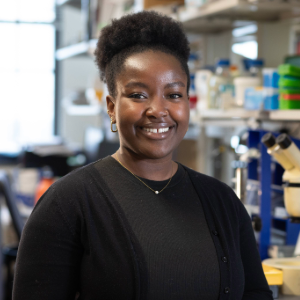
April 2024 Newsletter

April 2024 Newsletter

Student Profile
Nkatha Mwenda is a PhD student in the Northwestern University Interdepartmental Neurosciences (NUIN) Program. After falling in love with science in the sixth grade, Mwenda went on to earn her BA in biology from Kalamazoo College. Now in the lab of Talia Lerner, PhD, assistant professor of Neuroscience, she investigates the neuronal circuitry underlying compulsive-like behavior.
Where is your hometown?
I was born in Nairobi, Kenya and moved to the U.S when I was six. I lived in a few different states growing up but consider Grand Rapids, Michigan, my hometown.
What sparked your interest in science or medicine?
Growing up, I attended a school that had a sixth-grade environmental classroom. Part of the curriculum for the environmental classroom included going to a nature preserve twice a week and doing observational studies of the vegetation and the environmental changes over the seasons. This experience was my first introduction to scientific research and showed me how much fun doing science could be.
What are your research interests?
I am broadly interested the neuronal circuitry that underlies addictive and compulsive behavior. I am also interested in individual neuronal variations that may contribute to differences in susceptibility to disorders like substance abuse disorder.
What are you currently working on?
I am currently working on understanding the role that dopamine plays in the neuronal circuitry that underlies punishment-resistant reward-seeking behavior. Understanding punishment-resistant reward-seeking behavior is important for diseases like substance use disorder and obsessive-compulsive disorder, which have compulsive components.
Please tell us about a defining moment in your education at Feinberg thus far.
A defining moment that stands out for me, was writing my F31 grant application. It was a challenging experience but rewarding because after completing the application, I felt more knowledgeable about my project and my field.
What do you hope to do with your degree?
I hope to continue to do research that furthers our understanding of addictive and compulsive behavior. In addition, I hope to continue participating in science outreach initiatives because making science more accessible is very important to me.